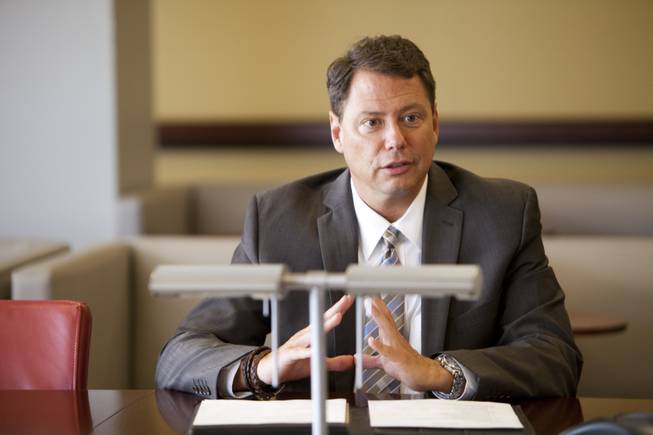
Clark County Superintendent Pat Skorkowsky is shown during a Las Vegas Sun editorial board meeting in August 2014. During a school board meeting in March 2016, Skorkowsky tried to soothe concerns over a projected $20 million tax revenue shortfall tied to tax caps that were established by the Nevada Legislature in 2005. The caps were meant to protect property owners from massive tax increases during the boom years, when property values were zooming up year after year. But since the downturn, amid property values that tanked and have only recently started rising again, the caps have hindered the school district.
Friday, March 18, 2016 | 2 a.m.
Property tax caps enacted by state legislators during the height of the housing boom did a good job protecting homeowners from skyrocketing tax bills.
But fast-forward more than a decade, and those same caps are coming back to haunt local government — especially the Las Vegas public school system.
Legislators in 2005 limited property tax increases for individual residential properties to 3 percent annually, to guard against massive hikes in tax bills for local residents given the double-digit increases in property values that were occurring during the boom. But when the downturn hit and property values plummeted, property tax revenue for local governments took a hit. And now, even though the housing market has improved in recent years, there's no relief in sight.
Why? Because the cap is based on a 10-year average of property value growth, and that average has fallen below zero because it contains the years immediately after the downturn when values tanked. Due to a complicated formula that uses the Consumer Price Index to set the cap under some circumstances, the limit will sink to 0.2 percent in fiscal year 2017 — meaning that homeowners will likely pay virtually the same property taxes they did last year.
“Effectively it’s zero percent,” said district Chief Financial Officer Jim McIntosh. “Nobody is going to pay any property tax increases this year.”
For the Clark County School District, already one of the most underfunded public school systems in the nation, the result is a red-alert situation. At a school board meeting last week, officials said the district would face a budget hole of around $20 million going into the next fiscal year.
Tax abatements have amounted to hundreds of millions of dollars worth of lost tax revenue that would have been available to local government to use on schools, roads and other services. This year, Clark County missed out on more than $432 million. Around $182 million of that would have gone directly into the school district general fund.
“It’s a concern for us that we have to continue to provide services, and this historically stable tax is now unstable,” McIntosh said.
The school district’s revenue from property taxes is below what it was even in 2006, a sore point for school officials at a time when problems like class sizes and elementary school overcrowding are only getting worse.
And if the caps stay in place, the losses to the school district could start compounding.
“There’s a potential for it to stay flat in the following years,” said McIntosh.
The caps also have coincided with budget cuts at Metro Police and Henderson.
Superintendent Pat Skorkowsky did his best to soothe alarmed school board members last week, assuring them that “we are working closely with individuals in the community who are helping us to resolve this issue.”
But it’s unlikely that anything will fix the problem before legislators can take action in Carson City next year.
“The only real fix here is a legislative fix,” McIntosh said.

Join the Discussion:
Check this out for a full explanation of our conversion to the LiveFyre commenting system and instructions on how to sign up for an account.
Full comments policy